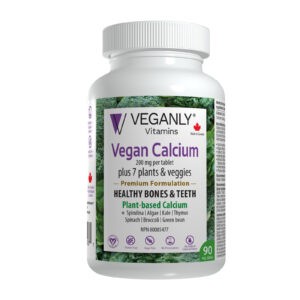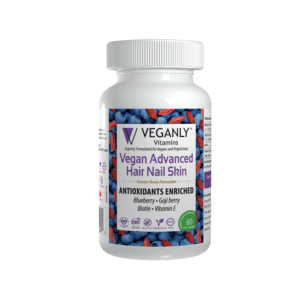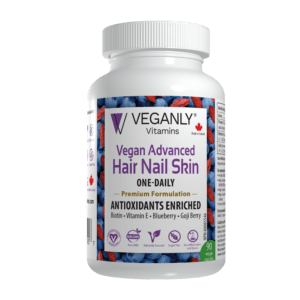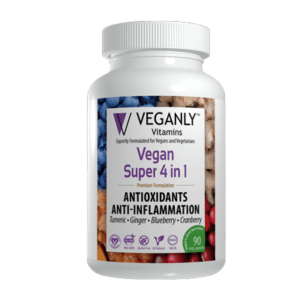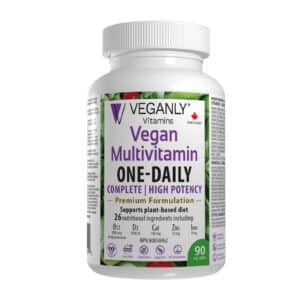By Dr. Andrew (WH) Tse, PhD
The Vegan Diet
Everyone has their own reason to be vegan: to reduce their carbon footprint, ethical concerns to animals and animal byproducts, to support sustainable farming practices, and to improve their overall health.
This supported by the American Academy of Nutrition Dietetics, Dietitians of Canada, and British Dietetic Association; who have deemed the diet suitable for all stages of life including during infancy and pregnancy.1–3
Benefits of plant-based diets
Several scientific studies have demonstrated health-benefits of plant-based diets on cardiovascular disease, hypertension, hyperlipidemia, obesity, type 2 diabetes, and cancer.4,5 Vegan diets have been attributed to increasing the dietary intake of protective nutrients and phytochemicals, which in turn can minimize the uptake of other dietary nutrients.6 According to the evidence criteria of the World Health Organization and the Food and Agriculture Organization (WHO/FAO), a vegan diet has the potential or possibility to reduce the risk of cardiovascular disease, osteoporosis, some cancers, and type 2 diabetes.5
a) Decrease the risk of cancer
Vegans consume more legumes, fruits, and vegetables which translates to increases in nutrients protective against cancer.7 It is shown to protect against lung, mouth, esophagus, stomach, prostate, and colorectal cancer.
Meat and animal byproducts have been associated with cancer (e.x. pancreatic and colorectal).7 Animal proteins possess a higher concentration of sulfur containing amino acids that are metabolized into acidic metabolites; resulting in a lower pH in the body. The acidic environment can contribute to cancer progression.8
b) Improve cardiovascular health and decrease cholesterol
In comparison to omnivorous diets, plant-based diets may reduce the risk of coronary heart disease events by an estimated 40% and the risk of cerebral vascular disease events by 29%.9 It also reduces the risk of developing type 2 diabetes by about 50%.
The higher consumption of fruits and vegetables in plant-based diets; which are rich in fibre, folic acid, antioxidants, and phytochemicals contribute to lower cholesterol, incidence of strokes, and mortality from cardiovascular diseases.9 The higher whole grain, soy, and nut intake also provide cardioprotective effects.5
In comparison to vegetarians, vegans have lower total and LDL cholesterol, modestly lower blood pressure, and lower body mass index.5,9 This may also contribute to the cardioprotective effects by lowering blood lipids and reducing the risk of heart disease.
c) Prevention and treating type 2 diabetes
Evidence has demonstrated adopting a vegetarian or vegan diet can decrease the risk of diabetes.9,10 Furthermore, diabetics who adopted a vegetarian or vegan diet have shown a decreased dependence on medication and lowered plasma glucose levels when combined with exercise.9,10 Even small adjustments to diet such as partial replacement of meat with soy products increased insulin sensitivity.9 Diabetes management also includes managing cardiovascular health and weight, in addition to blood sugar.
The Vegan vs Meat Diet – an overview
The vegan diet revolves around meatless products; emphasizing the intake grains and other seeds, legumes (i.e. beans), fruits, vegetables, and nuts to meet dietary needs. Vegan diets are higher in dietary fibre, magnesium, folic acid, vitamins C and E, iron, and phytochemicals.5
There are stark nutritional deficiencies in a plant-based compared to an animal-inclusive diet.4,11 For starters, it may be difficult to obtain all the necessary micronutrients with vegan diets, thereby requiring a variety of foods or supplementation. This mindfulness of nutrient intake is important. Differences in nutrient absorption are reported in Table 1. However this does not necessarily mean an animal-inclusive diet as better.
| Surplus | Deficit |
| Dietary fiber Folic acid Vitamin C Vitamin E Antioxidants Phytochemicals |
Protein Vitamin B12 Vitamin D3 Vitamin K2 Iron Calcium Magnesium Zinc |
Table 1. Surplus and deficiencies in vegan diets. Phytochemicals in plants interfere with the absorption of vitamins and minerals. As a result, the dietary intake of the recommended daily allowance may not necessarily be achieved.
a) Protein
An article written in 2013 by Dr. T. Colin Campbell, a professor of nutritional biochemistry, addressed the differences between animal and plant-derived proteins. The difference in amino acid profiles, the building blocks of protein, influences the rate of absorption by the body. Animal-based proteins are used more readily compared to plant proteins as there are more similar to human proteins.
b) Vitamins
Vitamin A
Vitamin A is crucial for maintaining healthy vision, cell growth, immune function, and fetal development. It is approximately 20 times more readily available in animal-based diets.
Retinoids or retinol are the readily available form of Vitamin A that is found in animals and their byproducts (i.e. eggs, milk, butter, cod liver oil, etc.). This means the body is able to use them
The main source of Vitamin A in vegan diets are found in plants such as carrots, sweet potatoes, kale, etc., like carotenoids, the precursor to retinol. The body must take convert these carotenoids into the retinol which the body can readily absorb.
An individual in good health can covert these carotenoids into retinol with ease.
Vitamin D3
Vitamin D3 is an important form of vitamin D that is readily used by the body. It is found in meats or produced in the body naturally through sun exposure.5 It is rarely found in plants and veggies. The absence of vitamin D3 can increase the risk of deficiencies in a plant-based diet.
Vitamin B12
Vitamin B12 is exclusively found in animal-based foods and it is vital for DNA, RNA, and blood cells. Deficiency causes fatigue and weakness. A lack of B12 can affect digestion and absorption of nutrients. It is advised vegans to take supplemental B12 or eat B12 fortified foods.4
Vitamin K2
Vitamin K2 is vital for blood clotting, calcium metabolism, and heart health. It is found in meat and fermented foods such as cheese, yogurt, fermented soybeans, and sauerkraut.
Vitamin absorption is highly dependent on dietary fats. Animal fats and butter are best to facilitate this absorption, as are olive and avocado oils, which are low in polyunsaturated fatty acids. Vegan alternatives such as vegetable/seed oils (i.e. soybean, sunflower, canola, etc.) are polyunsaturated fats and decrease absorption, especially for Vitamin K12.
c) Minerals
Absorption and bioavailability are influenced by phytochemicals in plants which hinder the absorption of important minerals like iron, calcium, magnesium, and zinc.5 These chemicals, phytates or phytic acid, are found in seeds, nuts, grains, and legumes. They also have the ability to inhibit key digestive enzymes such as amylase, trypsin, and pepsin to prevent proper digestion. As a result, even if the recommended dietary allowances are met, the body may still be deficient in minerals.
Iron
Iron deficiency is common in the world. Iron is vital for carrying oxygen to the cells of the body and its deficiency causes fatigue, weakness, pallor, and anemia. Memory and cognitive impairment are associated as well.5
Iron intake of vegans is greater than that of omnivores, however, it is less readily available in the body.4 A study of 75 German vegan women found that 40% were iron deficient despite meeting the recommended dietary allowance.12 The main difference is the iron source: animal vs plant-derived iron.
Animal-based products contain heme iron which makes it easily absorbed by the body. Plants, on the other hand, contain non-heme iron which is less readily absorbed in the body. Iron intake in vegans are often greater than omnivores but demonstrates less bioavailability.
d) Fatty acids Imbalance
Vegans lack sufficient EPA and DHA, essential omega-3 fatty acids found in fish. EPA and DHA maintain brain health, memory, and emotional well-being. A balance between omega-3 and omega-6 fatty acids (1:1 ratio) is ideal for good health. Vegetable oil intake skews the ratio towards omega-6 fatty acids; which are precursors to pro-inflammatory chemicals.
EPA and DHA also play important roles in metabolism, platelet aggregation, and brain and vision function.
What Veganly offers?
Though there are many benefits to adopting a vegan lifestyle; it is important to ensure the body has all the essential nutrients. Veganly offers plant-based and naturally sourced supplements to meet dietary deficiencies associated with vegan, vegetarian, and plant-based diets.
References
- Dietitians of Canada. What You Need to Know About Following a Vegan Eating Plan. Available at: http://www.unlockfood.ca/en/Articles/Vegetarian-and-Vegan-Diets/What-You-Need-to-Know-About-Following-a-Vegan-Eati.aspx.
- Craig, W., Mangels, A. & American Dietetic Association. Position of the American Dietetic Association: Vegetarian Diets. J. Am. Diet. Assoc. 109, 1266–1282 (2009).
- British Dietetic Association. British Dietetic Association confirms well-planned vegan diets can support healthy living in people of all ages. Available at: https://www.bda.uk.com/news/view?id=179.
- Fields, H. et al. How to Monitor and Advise Vegans to Ensure Adequate Nutrient Intake. J. Am. Osteopath. Assoc. 116, 2016–2019 (2016).
- Craig, W. Health effeets of vegan diets 1-3. Am. J. Clin. Nutr. 89, 1627–1633 (2009).
- Dewell, A., Weidner, G., Sumner, M. D., Chi, C. S. & Ornish, D. A Very-Low-Fat Vegan Diet Increases Intake of Protective Dietary Factors and Decreases Intake of Pathogenic Dietary Factors. J. Acad. Nutr. Diet. 108, 347–356 (2008).
- World Cancer Research Fund. Food, nutrition, physical activity, and the prevention of cancer: a global perspective. (2007).
- Webb, B. A., Chimenti, M., Jacobson, M. P. & Barber, D. L. Dysregulated pH: A perfect storm for cancer progression. Nat. Rev. Cancer 11, 671–677 (2011).
- Kahleova, H., Levin, S. & Barnard, N. Cardio-metabolic benefits of plant-based diets. Nutrients 9, 1–13 (2017).
- Olfert, M. D. & Wattick, R. A. Vegetarian Diets and the Risk of Diabetes. Curr. Diab. Rep. 18, 1–6 (2018).
- Rogerson, D. Vegan diets: Practical advice for athletes and exercisers. J. Int. Soc. Sports Nutr. 14, 1–15 (2017).
- Waldmann, A., Koschizke, J. W., Leitzmann, C. & Hahn, A. Dietary Iron Intake and Iron Status of German Female Vegans: Results of the German Vegan Study. Ann. Nutr. Metab. 48, 103–108 (2004).

